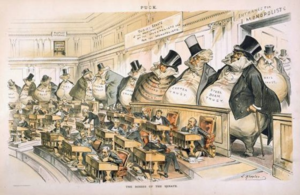On the Gilded Age Robber Barons…And the Debate I LOST!
HotH2OHistory.com

On the Gilded Age Robber Barons…And the Debate I LOST!

I heroically took the PRO side in a debate against my brilliant students on the resolution:
The so-called “Robber Barons” were malevolent crooks who bilked the American public to get rich.
Well, that did not go well–and I lost!
Hear it all here.
american history Andrew Carnegie debate Gilded Age Jacob Riis John D. Rockefeller robber barons students
Leave a Reply Cancel reply
Products
-
 Saint Ephrem the Syrian $23.50
Saint Ephrem the Syrian $23.50 -
 Saint Paul $24.50
Saint Paul $24.50 -
 Blessed Franz Jägerstätter $24.50
Blessed Franz Jägerstätter $24.50
Newsletter
Recent Posts
Recent Comments
- Clement of Alexandria on Fire on the Mountain
- Gary Richied on Trolling All Pentagon Hacks
- Gary Richied on Resist the Pope Francis Dictatorship–All Year Long
- JimmyCrackCorn on Bypass the (Historical) Breakers–Better, Remove Them Altogether
- Michael Ehrmantrout on Saint Polycarp (Color)
Archives
- April 2025
- January 2025
- November 2024
- September 2024
- August 2024
- June 2024
- May 2024
- February 2024
- January 2024
- December 2023
- November 2023
- October 2023
- September 2023
- August 2023
- July 2023
- June 2023
- May 2023
- April 2023
- March 2023
- February 2023
- January 2023
- December 2022
- November 2022
- October 2022
- September 2022
- August 2022
- July 2022
- June 2022
- May 2022
- April 2022
- March 2022
- February 2022
- January 2022
- December 2021
- November 2021
- October 2021
- September 2021
- August 2021
- July 2021
- June 2021
- May 2021
- April 2021
- March 2021
- February 2021
- January 2021
- December 2020
- November 2020
- October 2020
- September 2020
- August 2020
- July 2020
- June 2020
- May 2020
- April 2020
- March 2020
- February 2020
- January 2020
- December 2019
- November 2019
- October 2019
- September 2019
- August 2019
- June 2019
- May 2019
- April 2019
- March 2019
- February 2019
- January 2019
© 2025 Hot Water History. Built using WordPress and the Mesmerize Theme
4 Responses
Fun debate—I wish my kids could have you as a teacher!
At about 31:30, I’m not sure I understand your reasoning about “slack.” The audio was choppy, but it sounded like you said if you pay your workers too much, it incentivizes them to work less and to find a different job. I don’t get the reasoning.
No, you’re quite right. I did not mean slack in the technical sense of resources not used.
However, there is a form of slack–or unintended lack of productivity–should a laborer be overcompensated and thus moved toward other pursuits besides the functions for which he was intitally hired or that most suit the employer.
As to what the term is for that, I am at a loss. Should you know it or could direct me to a source about that, sharing such would be greatly appreciated.
Sorry, I’m the last person you should ask for economics terms. 🙂
I’m still having trouble wrapping my head around the idea you’re trying to get across. If a low-skill worker starts getting overcompensated, how would that incentivize him to pursue a different job? Maybe if you could give me an example, I could see it more clearly.
Great. Let me try to explain with a thought experiment, one dependent upon the law of marginal utility.
Let’s say that a moving company hires a driver. That company invests in the driver even before he begins work in terms of background checks, time spent in interviews, on-boarding, etc. Then, the company invests further in terms of training, licensing, bonding, etc.
In our scenario then, the driver goes on any number of jobs wherein he gets over-compensated (relative to market price per move and even his own expectations). He thus might be incentivized to take a vacation with the access money, take one or several less jobs due to the fact that his income status has changed thus too his subjective calculus pertaining to marginal utility. He might even–at anytime to the detriment of the employer–simply up and quit, preferring another job (of even lesser pay), retirement, etc.
The same scenario could play out for an Uber driver, a housing contractor, a miner, and even salaried workers who might have an even more complicated range of incentives to pursue other jobs, careers, status, or credentials away from the presently held job.